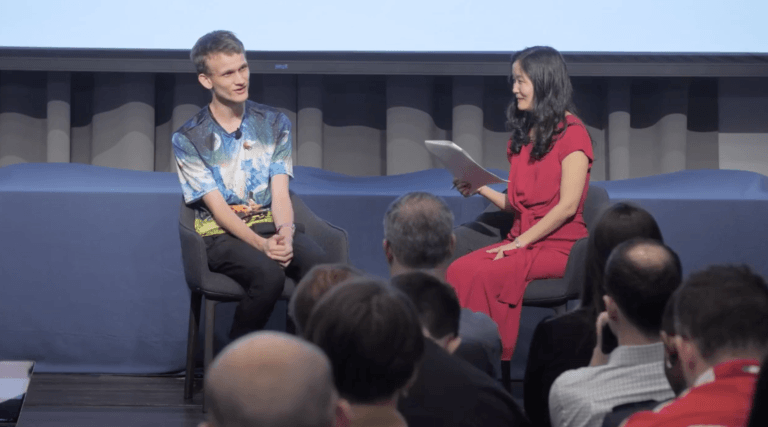On March 20th, in New York City, Vitalik Buterin, the creator of Ethereum, talked to crypto-focused journalist Laura Shin at a live taping of her Unchained podcast (at the Columbia Graduate School of Journalism’s Pulitzer Hall), and answered questions on a wide range of topics. Here are some key highlights from this interview.
What Vitalik Thinks About Zcash (ZEC)’s ‘Dev Tax’
“Zcash is interesting… Definitely, like big props to them for just doing that and being proud of that and saying like ‘you know, we got a 20% dev tax, what’s up man?’. I am very proud of them for doing that. So, a great job, Zucco! But on the other hand, they clearly haven’t solved the problem of where to allocate the money because, right now, they just have this centralized allocation pool that goes to Zcash company, or these individuals, or these other individuals, and they have hard forks, and these hard forks can decide to reallocate the pool, but then what process do they use to decide, and so it’s definitely very far from the ideals that a lot of people see cryptocurrencies as having… It’s still an improvement from no funding… It would be really nice if there was some decentralized process for achieving the same thing.”
Why the Price of Ether (ETH) Is Important
“I’m going to be really candid because that’s the right thing… Some of the earlier rhetoric, especially veering on the more extreme side of the price not mattering at all, in part was counter signaling to distinguish ourselves from other crypto projects that just do pumping and lambo-ing way too much, but another thing is that it was about minimizing legal risk by basically trying to make the project seem more distant from something that will be covered by financial regulation…
If people try to claim the price doesn’t matter at all, they [the financial regulators] are totally going to see through that…
I can tell you… why the price being higher than lower… is good.
One of them is, obviously, security. So if the price is zero, the network can’t be secure, and that’s true in Proof-of-Work or Proof-of-Stake.
Another reason is, obviously, that there’s a lot of projects who in the ecosystem hold cryptocurrency… and if the price is higher, then they’ll have more money to do the things they want to do…
Especially, the security concern is a totally legitimate technical argument.
There are members of the Ethereum community who just say that ‘Ether is a cryptocurrency and we want it to be more of a cryptocurrency’…
The Ethereum Foundation doesn’t have a monopoly on Ethereum messaging, or even a hegemony on Ethereum messaging at this point…
The thing I am absolutely opposed to is engineering pumps for the sake of pumps because that’s just a short term that’s fundamentally dishonest. The thing I am definitely in favor of is not doing stupid that would lead to the price going to zero. So, one example of that would be having an issuance of like 100 million ether every year. Regardless of what other consequences that has, that would clearly drop the price to zero, and that would clearly be just terrible.”
Decentralized Finance (DeFi) and Smart Contract Code Risk
“I’m definitely watching the whole DeFi space with interest and fascination…
[On Twitter] Someone was trying to say something like ‘Why doesn’t pretty much everyone just take their money out of their bank accounts and put it into Dai earning interesting on Compound because that pays better rates, why would you just not get a free 3%?’. And I am like ‘Excuse me, free? Are you really that confident that that contract has less than a 3% chance a year of having a bug in it?’. I mean, I honestly don’t know how to measure the chances of those contracts having bugs in them, but there’s definitely far too many people that round those risks to zero.”
If Vitalik Had a Time Machine, What Advice He Would Give Satoshi
“github.com/ethereum/eth2.0-specs”…
When Laura asked Vitalik if he was really serious about telling Satoshi to build Ethereum 2.0, he answered: “I do think it’s a good architecture!”
He then went on to elaborate:
“First of all, Satoshi had a really hard job because he just could not have predicted which way the ecosystem would have gone… I think on a technical level, suggesting a path that opens the door to upgradeability, to proof-of-stake, to more powerful virtual machines…”
What Vitalik Thinks Will Be the First Mainstream Use Case for Cryptocurrency
“Things I am near term optimistic about include first of all, the decentralized finance space… second of all, gaming [as in videogames]… on the non-financial side, identity, credentials, key revocation, and all of those things… fourth is parametric insurance… this is insurance that [for example] says if some extreme weather event happens, then pay me $500.”









